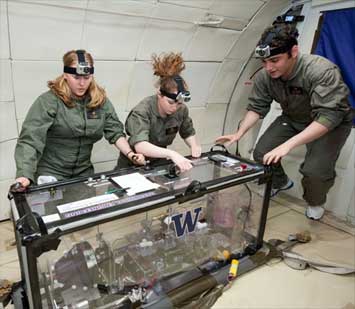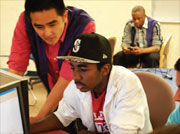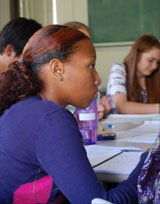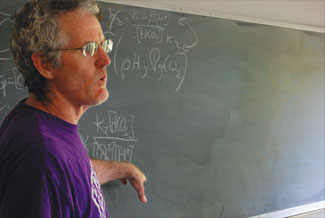
Capstone Support Launches Students into Real-World Engineering
Eight students lurched, tumbled, and floated through an unforgettable final lab project. Participants in NASA’s Microgravity University in Houston spent the last week of their undergraduate careers carrying out an experiment they designed for a reduced-gravity environment.
This was the second year UW undergraduates have participated in the program. Student teams carry out an experiment aboard an airplane that provides brief experiences of a weightless environment. Each project must address a current problem in space science and be of possible use to NASA. The UW students built a spinning drum to store and transfer fuel in zero gravity and were among a dozen undergraduate teams chosen to participate.
Though it was serious engineering, this wasn’t a typical lab class. This year’s welcome meeting was cut short by a chance to meet the recently returned crew of the Endeavor space shuttle. The week-long trip included tours of full-scale replicas of the space shuttle and the International Space Station. Students also visited Mission Control sites for the shuttle, space station, and historic Apollo missions.
A two-hour flight aboard the Weightless Wonder was the highlight. The aircraft flies in reserved air space over the Gulf of Mexico doing a series of parabolic arcs. With each arc the plane flies up at a 45-degree angle for 90 seconds during which gravity feels twice as strong as on Earth, then drops in freefall for about 30 seconds in which passengers experience weightlessness. At the beginning of each parabola students gather their composure to set the experimental parameters and flip a switch to begin recording data. And yes, the flight did live up to the airplane’s unsavory nickname, the “Vomit Comet.”
Students are responsible for all aspects of the project, including designing and building the experiment, conducting outreach activities, and raising funds for equipment, travel, and medical exams. To cover some of the costs, the students applied for and received support from the College of Engineering’s Capstone Fund. Capstone design projects are a UW Engineering rite of passage for seniors. The Capstone Fund was developed to support students’ pursuit of their professional interests and to allow them to tackle real-world engineering problems. Gifts from alumni and friends provided critical support for the microgravity capstone project and many others.
Read more about the capstone project and watch a video about a recent tidal turbine capstone project.
What Works is Work at the Summer Math Academy
The rigor of pre-engineering coursework can be a harsh reality for incoming college freshmen. Students who thought they were well prepared for college sometimes struggle to keep up in math classes. All kinds of students fall into the gap.

This summer 32 high school students spent four weeks on campus participating in the Math Academy, a program designed by UW Engineering to help high-achieving students develop the math and problem-solving skills necessary to succeed in engineering. Applications are open to students entering the senior year of high school, the program targets groups underrepresented in engineering, including African American, Latino, Native American, Pacific Islander, female, and first-generation students.

Math Academy is in its third year and was designed by Dave Prince, lead instructor for the program. His math-teaching philosophy is simple: “What works is work.” If students are willing to work hard, he’s willing to be there with them. But it’s not all work as the students experience life on a college campus. Each day is packed with learning, activities, and some down-time in the dorm. Students also have opportunities to explore a wide-range of engineering careers through lab tours, research projects, site visits and professional networking events with alumni.
In Math Academy what works is indeed work. Ten students from the 2009 class are now students at the UW and ten from the 2010 class will enter UW this fall making the case for a summer vacation well spent.

Learn more about Math Academy.